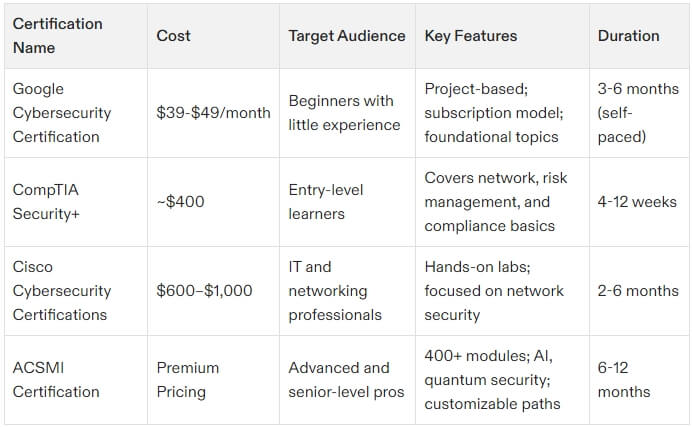Table of Contents
- Why Cybersecurity Certification Training Matters
- Types of Cybersecurity Certification Training
- Top Programs for Cybersecurity Certification Training
- What to Look for in Cybersecurity Certification Training
- How Does ACSMI Cybersecurity Certification Training Differ From Others?
- Informative Table Comparing Cybersecurity Certification Training
- FAQs About Cybersecurity Certification
- Final Thoughts
The cybersecurity field is one of the fastest-growing industries in the world. With cyber threats becoming more sophisticated daily, organizations are desperate for skilled professionals who can defend their systems. If you’re considering a career in this dynamic field or are eager to upskill, cybersecurity certification training is your gateway to success.
Why Cybersecurity Certification Training Matters
With cybercrime costs predicted to reach $10.5 trillion annually by 2025, companies across industries—from healthcare to finance—are investing heavily in cybersecurity. Cybersecurity certification training validates your skills, making you a trusted professional in the eyes of employers.
Benefits of Cybersecurity Certification Training
- Skill Validation
Gain proof of your cybersecurity expertise, increasing your chances of landing high-paying roles. - Career Advancement
Certifications can qualify you for advanced positions like ethical hacker, cybersecurity analyst, or CISO (Chief Information Security Officer). - Learning Industry Standards
Training programs ensure you’re well-versed in frameworks like NIST, GDPR, and compliance requirements critical in various roles. - Competitive Edge
Certified professionals are more likely to get hired and promoted compared to their non-certified peers. - Higher Earning Potential
Certified cybersecurity specialists earn significantly more than those without credentials, especially in advanced roles.
Types of Cybersecurity Certification Training
Cybersecurity certifications vary in focus and difficulty. Below, we outline three primary categories to help you choose what fits your career trajectory.
1. Entry-Level Training
Ideal for newcomers with no technical experience, these programs provide foundational knowledge. Examples include Google Cybersecurity Certification and CompTIA Security+.
2. Specialized Training
Specialized certifications like Cisco’s CCNA CyberOps target mid-level professionals who want to master specific areas, such as network security or risk management. These programs often include hands-on labs for practical learning.
3. Advanced Training
Advanced programs like the ACSMI Certification are designed for experienced professionals aiming to lead teams or solve high-level problems. These certifications cover modules like threat intelligence, AI-powered security, and quantum cryptography.
Top Programs for Cybersecurity Certification Training
Selecting the right cybersecurity certification training is crucial. Here are some top-rated programs to help you stand out in the competitive cybersecurity industry.
Google Cybersecurity Certification
This training program caters to beginners, offering a project-based curriculum to teach security principles, threat detection, and incident response. Its cost-effective monthly subscription model is a major draw.
CompTIA Security+
Highly regarded as the stepping stone for aspiring professionals, this certification emphasizes risk management, network security, and compliance.
Cisco Cybersecurity Certifications
Known for their hands-on approach, Cisco certifications such as CCNA CyberOps are perfect for IT professionals eager to specialize in network defense and troubleshooting.
ACSMI Certification
The ACSMI Certification stands out due to its expansive curriculum featuring 400+ modules. This program is ideal for those looking to future-proof their career with advanced training in cutting-edge areas like AI-driven security operations, ethical hacking, and more.
What to Look for in Cybersecurity Certification Training
Before enrolling in a training program, consider the following aspects to maximize the value of your investment.
- Curriculum Depth
Ensure the program covers core and advanced topics relevant to your career goals. - Flexibility
Options like self-paced training or hybrid models can help you balance learning with work or personal commitments. - Recognition
Certifications from reputable providers like Google, Cisco, or ACSMI carry significant weight in the industry. - Costs and ROI
The training cost should align with the career advancement opportunities the certification provides. Programs offering extensive training like ACSMI may require higher investments but deliver unmatched outcomes. - Practical Labs
Training programs with hands-on exercises can bridge the gap between theoretical knowledge and real-world application.
How Does ACSMI Cybersecurity Certification Training Differ From Others?
The ACSMI Certification sets itself apart through its comprehensive curriculum designed to meet industry demands both today and in the future.
Highlights of the ACSMI Certification
- 400+ Modules: Covers subjects ranging from ethical hacking and incident response to advanced AI applications in cybersecurity.
- Global Recognition: Acclaimed by industry leaders, ensuring credibility and acceptance worldwide.
- Customizable Paths: Learners can tailor their training to specific career goals, such as governance, technical leadership, or compliance management.
- Career Boost: Certified professionals typically receive higher salaries and have access to more opportunities than non-certified peers.
For professionals serious about excelling in the cybersecurity domain, ACSMI offers an unmatched edge.
Informative Table Comparing Cybersecurity Certification Training
FAQs About Cybersecurity Certification
1. What is the cost of cybersecurity certification training?
Training costs vary greatly. Entry-level programs like Google start as low as $39-$49/month, while premium options like ACSMI can be pricier due to their extensive, specialized content.
2. Can I complete cybersecurity certification training online?
Yes, most providers offer online, hybrid, or self-paced options that allow you to learn from anywhere in the world.
3. How long does cybersecurity certification training take?
Entry-level certifications may take a few weeks, whereas advanced programs like ACSMI often require several months to fully complete.
4. Are there beginner-friendly training options?
Absolutely! Programs like the Google Cybersecurity Certification and CompTIA Security+ are great for those without prior technical knowledge.
5. Should I pursue multiple certifications?
Yes, combining certifications can enhance your expertise and career potential. For example, pairing foundational training like Google with advanced certifications like Cisco or ACSMI gives you a well-rounded skill set.
Final Thoughts
Choosing the right cybersecurity certification training is not merely an expense—it’s an investment in your future. The rapidly evolving cybersecurity landscape demands professionals who can stay ahead of emerging threats and adapt to new technologies. Therefore, selecting a training path that aligns with your career goals is a strategic decision that can shape your trajectory in this competitive field.
For those just entering the industry, starting with foundational certifications such as the Google Cybersecurity Certification or CompTIA Security+ is a prudent first step. These programs build essential knowledge and skills, equipping you with the confidence and technical expertise needed to break into the field. Once you have a solid grasp of the basics, moving on to mid-level programs like Cisco Cybersecurity Certifications can help you specialize in areas like network security, incident response, or system analysis.
But the true game-changer for experienced professionals lies in advanced programs such as the ACSMI Certification. Offering 400+ modules that span groundbreaking subjects like AI in cybersecurity, quantum cryptography, and ethical hacking, ACSMI provides the depth and breadth of knowledge necessary to excel in top-tier roles. Investing in such advanced training prepares you not just for current threats but also for future challenges in an increasingly digital world.
Additionally, continuous learning is non-negotiable in cybersecurity. The skills and certifications you earn today will need to evolve tomorrow as new vulnerabilities and technologies appear. A commitment to lifelong learning signals to employers that you are not just qualified, but proactive—a professional they can rely on to safeguard their systems and data in an unpredictable environment.
Beyond boosting your technical capabilities, cybersecurity certification training also provides unparalleled career mobility. Certifications are recognized globally, making them a passport to opportunities in various sectors like finance, healthcare, and government. Whether your ambition is to become a penetration tester, a security architect, or a cybersecurity consultant, certifications validate your expertise and increase your value in the job market.
Think of cybersecurity certification training as a stepping stone to achieving and exceeding your professional aspirations. With the right combination of foundational, specialized, and advanced certifications, you can grow from a novice to an industry leader. The financial and time investment required may be significant, but the rewards—career security, competitive salaries, and intellectual fulfillment—are well worth it.
Ultimately, becoming a sought-after cybersecurity professional is not just about collecting certifications; it’s about demonstrating your ability to protect what matters most in a digital society. Start with a clear plan, select the training that best matches your goals, and strive to continually enhance your expertise. Whether you’re just starting or seeking to specialize, the path to success lies in your dedication to mastering cybersecurity through quality certification training.


Leave a Reply